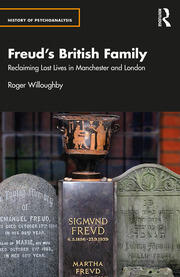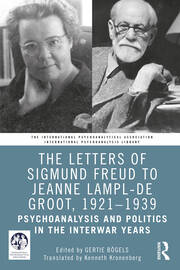Freud’s British Family: Reclaiming Lost Lives in Manchester and London
Part of The History of Psychoanalysis series - more in this series

Book Details
- Publisher : Routledge
- Published : October 2024
- Cover : Paperback
- Pages : 254
- Category :
Psychoanalysis - Catalogue No : 97894
- ISBN 13 : 9781032651989
- ISBN 10 : 1032651989
Also by Roger Willoughby
Masud Khan: the Myth and the Reality
Price £25.00
There are currently no reviews
Be the first to review
Freud’s British Family presents ground-breaking research into the lives of the British branch of the Freud family, their connections to the founder of psychoanalysis, and into Freud’s relationship to Britain.
Documenting the complex relationships the elder Freud brothers had with their much younger brother Sigmund, Freud’s British Family reveals the significant influence these hitherto largely forgotten Freuds had on the mental economy of the founder of psychoanalysis. Roger Willoughby shows how these key family relationships helped shape Freud’s thinking, attitudes, and theorising, including emerging ideas on rivalry, the Oedipus complex, character, and art. In addition to considering their correspondence and meetings with Freud in Continental Europe, the book carefully documents Freud’s own visits to his brothers and to Britain in 1875 and again in 1908. Freud’s British Family concludes with a discussion of Freud’s final 15 months in London after he left Nazi Vienna as a refugee. Freud’s British Family offers a rich, contextualised understanding of the sibling, familial, and socio-cultural ties that went into forming the tapestry of psychoanalysis.
Freud’s British Family will be of great interest to psychoanalysts and psychotherapists in practice and in training, and to scholars of the history of psychoanalysis, twentieth century history, psychosocial studies, and Jewish studies.
Reviews and Endorsements
This book is the best and most detailed thing ever written about the Freud brothers who emigrated to England, their businesses and families, and their important relationship with Sigmund Freud. Roger Willoughby has devoted more than a decade to researching the British branch of the Freud family. And he has uncovered things that Freud biographers have laboured in vain to research for decades. Highly recommended!
Christfried Tögel, editor of the Sigmund Freud Gesamtausgabe, the first complete Freud edition in 23 volumes, and author of Sigmund Freud 1856-1939: A Biographical Compendium
A fascinating, evocative, and enlightening portrayal and study of many aspects of Freud’s history not clearly laid out before. The phrase in the title ‘lost lives’ touches both loss and gains in the vicissitudes of Freud’s history and makeup. That he would die in England on Yom Kippur a year after seeking safety in England keeps the mystery of his life open and in this book lives and character of the Freud family sparkle in depth and richness.
Michael Eigen, psychoanalyst, author of The Psychotic Core, The Mystical Psychoanalyst, Feeling Matters, and Bits of Psyche
Willoughby has dug deep and brought us lost shadows behind Freud - and now, not so lost. No individual exists outside his context. This extensively researched history places Freud within forgotten elements of his family. His family was the setting from which the Oedipal world of early psychoanalysis sprang and which has demanded the willing and unwilling review of human nature in the twentieth century. In other words, no man is an island outside the spreading ocean of his original family. There could be no more relevant context in which to place Freud. And this book contributes a well-researched aim into the heart of psychoanalysis itself.
R. D. Hinshelwood, Emeritus Professor of Psychoanalysis, University of Essex, Fellow of the British Psychoanalytical Society, founder of Psychoanalysis & History, and author of A Dictionary of Kleinian Thought amongst other books
In this very interesting book, Roger Willoughby uses newly available archives to relate the history of Freud’s ‘English’ family in depth. Settling in Manchester, Emmanuel and Philipp Freud became importers of fancy goods – haberdashery, perfumes, trinkets, fabrics – and integrated perfectly, each in their own way, into the English Jewish bourgeoisie. Freud visited them twice, in 1875 and 1908. Willoughby hypothesizes that Freud’s links with Britain materialized through his relationship with his brothers, giving rise to his Anglophilia and to his admiration for the constitutional monarchy. This attachment would partly explain why Freud chose, in 1938, to go into exile in London, city of the superego, symbol of a liberal regime conducive to the development of psychoanalysis. From a historiographical point of view, the author relies on modern principles of a study of ‘minor lives’ or anonymous existences, generally repressed by official history. Here is a work which testifies to the richness of studies devoted to Freud over the past twenty years.
Élisabeth Roudinesco, Head of Research in History at the Université de Paris VII-Diderot, psychoanalyst, and author of Jacques Lacan & Co and Freud: In His Time and Ours
Biography often creates protagonist-giants trampling their contemporaries. John Freud, Sigmund’s infant playmate, vanished so mysteriously from the historical record that certain fantasists could even argue Freud had killed him. In a sense Freudian historiography has done just that. By dint of intense and wide-ranging research, Roger Willoughby has finally managed to sketch John’s actual story – and thus restore him to life. On a wider scale Willoughby’s book maps out the web of relationships between Freud and his Manchester relatives -- his half-brothers, Emanuel and Philipp and their families. Willoughby has not only traced as much of their history as can be recuperated from the archival records, he also unearths their previously ignored influence on Freud’s character and work throughout his life. What makes this research remarkable is its passion to reclaim for history neglected figures who have hitherto been treated as mute bystanders. Willoughby asserts their value and agency. The Freuds of Bloom Street, Manchester, bear comparison with Joyce’s Leopold Bloom: in Willoughby’s telling they are all accorded the respect due to the common man, the real ‘hero’ of our anti-heroic culture.
Michael Molnar, ex-Director of the Freud Museum, London, author of Looking Through Freud’s Photos and editor of The Diary of Sigmund Freud 1929-1939
Roger Willoughby has written a fascinating and absorbing narrative of Freud’s ‘British family’, and its enduring presence in his life and work. Freud’s British Family holds the promise of deepening our appreciation of how Freud’s psychoanalytic thought reflected his lived experiences with the Freud ‘families’ he came to know in Manchester, Vienna, and Freiberg. In focusing on Freud’s British family, the author has made a genuinely new contribution to Freud biography and the historiography of psychoanalysis.
Nellie L. Thompson, New York Psychoanalytic Society and Institute, editor of 100 Years of the IPA: The Centenary History and Play, Gender, Therapy: Selected Papers of Eleanor Galenson
Table of Contents
Brief synopsis
List of images
List of charts and tables
Acknowledgements
Abbreviations used
Introduction
1. The Freud family: Sites of belonging, imagination, and diaspora
2. Settling in Britain: Kinship, social networks, and material enterprise
3. Emanuel’s trilogy of loss, pain, and relocation
4. ‘Talking, walking, eating and drinking’: Freud’s 1875 visit to Britain
5. Emanuel in everyday life 1875-1907: Identity, art and pathology
6. From an ‘insignificant little man’ to a Joycean hero: Philipp Freud’s journeys
7. Freud’s 1908 visit to Britain
8. Savigny Platz to Platt’s Siding: Emanuel’s final journeys
9. Freud’s British nephews: Sam and John
10. Berggasse in London, NW3, 1938-1939
11. Epilogue
Sources and references
Index
About the Author(s)
Roger Willoughby is a clinical psychologist, historian, academic, and writer. He is a Fellow of the Royal Historical Society and holds doctorates in psychoanalytic studies from the University of Kent and University of Oxford.
Customer Reviews
Our customers have not yet reviewed this title. Be the first add your own review for this title.
You may also like
The Letters of Sigmund Freud to Jeanne Lampl-de Groot, 1921-1939:...
Gertie Bögels
Price £28.79
save £3.20
Sigmund Freud and His Patient Margarethe Csonka: A Case of Homosexuality in a...
Michal Shapira
Price £29.99








